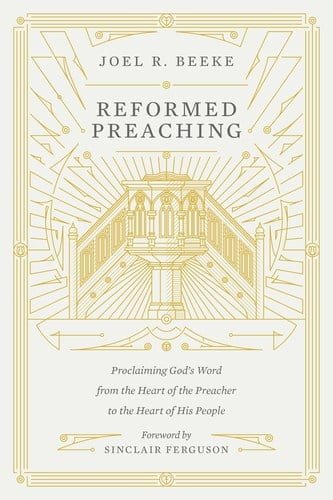⏱️ Estimated Reading Time: 5 min read
Preaching the Word of God is at the very center of pastoral ministry. Indeed, the task of preaching God’s Word that should occupy a good portion of the pastoral week. Neglecting this critical responsibility results in weak sheep who are unable to discern the times. Minimizing or marginalizing preaching always leads to a malnourished flock.
Joel R. Beeke addresses the matter of preaching in his latest volume. Reformed Preaching: Proclaiming God’s Word from the Heart of the Preacher to the Heart of the People underscores the importance of the preaching task and inspires every expositor who is set on obeying the biblical mandate. Beeke alerts readers to his purpose early in the book:
May God graciously use this book to promote God-honoring preaching that addresses the real needs of his people – preaching that is not only biblically doctrinal, covenantal, redemptive, and practical, but also biblically and warmly experiential both in its applicators and discriminatory dimensions for the building up of the universal church.
At the center of Beeke’s concern is preaching that engages the affections, a quality that is sorely absent from many Reformed pulpits. He offers a stern warning for preachers who provide good instruction but fail to nourish the flock of God! This identical concern also occupied the attention of Jonathan Edwards:
I should think myself in the way of my duty to raise the affections of my hearers as high as I possibly can provided that they are affected with nothing but the truth. Our people don’t so much need to have their heads stored, as to have their hearts touched; and they stand in the greatest need of that sort of preaching that has the greatest tendency to do this.
Herein lies the dilemma for the preacher – engaging both the head as well as the heart. Tragically, too many Reformed preacher’s aim for the head and miss the heart altogether. Beeke’s work seeks to remedy this dreadful state of affairs. This work focuses on three areas that help accomplish the above objective.
Part One describes Reformed experiential preaching. Beeke writes, “Reformed experiential preaching uses the truth of Scripture to shine the glory of God into the depths of the soul to call people to live solely and wholly for God.” Such preaching “reaches people where they are in the trenches and gives them tactics and hope for the battle.” Beeke offers several benchmarks that help shore up the definition of Reformed expository preaching:
- Tests genuine Christian experience by the standard of biblical truth – idealistically, realistically, and optimistically.
- Draws lines distinguishing between believers and unbelievers.
- Makes frequent and wise application of truth to life.
- Balances biblical, doctrinal, experiential, and practical elements.
- Cultivates a life of communion with our God and Savior.
- Builds experience upon the foundation of Scripture.
- Goes beyond contemporary superficiality into the deep wisdom of old paths.
- Offers food to satisfy the new spiritual sense of the believer’s soul.
- Touches the heart with the bitterness of sin and the sweetness of grace.
Experiential preaching passionately proclaims the timeless truths of Scripture without apology. Experiential preaching is deeply Reformed, that is, “it helps people to see God as the great King of grace, present and working at all times and places to carry out his wise plan of eternal love.”
Part Two illustrates Reformed experiential preaching. Fifteen chapters are packed with examples of how to preach in this fashion. The like of Calvin, Goodwin, Bunyan, Edwards, and contemporary pastors like Lloyd-Jones are presented which provide a wealth of information and inspiration. This section is historically illuminating and practical from start to finish.
Part Three addresses preaching experientially today. A host of lessons are set forth for contemporary preachers to meditate upon and immediately apply. Beeke urges preachers to be balanced in their approach: “We must speak with the tenderness of a nursing mother and the earnest love of a father, sharing with them not only the truth but opening our very souls to them.”
The author encourages preachers to be bold, even when some react with scorn to biblical dogma:
“At first a sinner may dread and hate God’s sovereignty. But when convinced of his responsibility to repent and his inability to do so, God’s sovereignty becomes the sweetest of attributes, for only a sovereign Savior can help us.”
Above all, our preaching must be Christ-centered. This theme occurs again and again in this volume, leaving preachers no room to equivocate or compromise. Preachers are reminded that “it is a fact of human nature that men would rather do penance (to try to atone for sin by doing good works) than repent (to hate and forsake sin). Therefore, faithful preachers must be Christ-centered as they stand behind the pulpit.
It is exceedingly difficult to convey the depth and richness of Joel Beeke’s Reformed Preaching. This volume is educational, inspirational, and will serve preachers for many years to come. I eagerly commend this work and trust that it will be a mighty tool for many and fervently pray that the flock of God will be better nourished as a result of this marvelous book!




